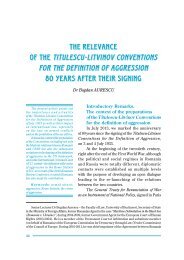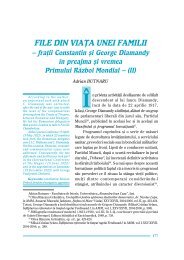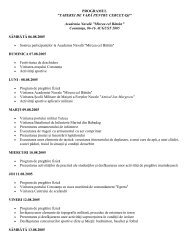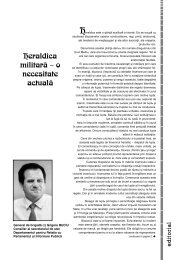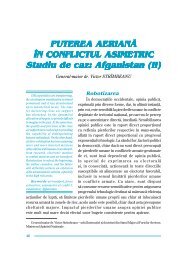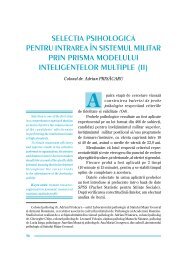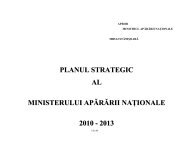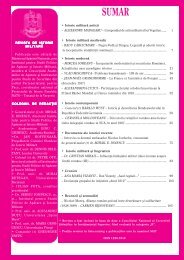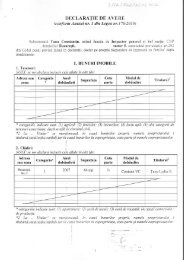Create successful ePaper yourself
Turn your PDF publications into a flip-book with our unique Google optimized e-Paper software.
peace would be conducted in Bucharest. Following<br />
this, the Prime Minister expressed the opinion that<br />
it would be advisable for Greece to accept the<br />
conclusion of the armistice, leaving the final<br />
decision to Commander in Chief, King Constantine,<br />
because of the clearly military nature of the issue: 6<br />
“The Ambassador of Austria-Hungary informed me<br />
of the telegram sent by Count Berchtold, who after<br />
setting out the proposal made by Romania that<br />
delegates be sent to Nish to conclude peace and<br />
that peace negotiations be held in Bucharest, added<br />
to Baron Brown: - Please insist on the Romanian<br />
proposal being accepted and make the observation<br />
that a refusal shall not improve the position of the<br />
two allied states. We shall be obliged to see in an<br />
eventual refusal the proof that Greece and Serbia<br />
seek to suffocate Bulgaria, which we shall not<br />
permit -. I told Mr. Brown that his proceeding is so<br />
serious that I cannot give an official reply before I<br />
consult with the Ministerial Cabinet and receive<br />
the King’s approval. However, I cannot but protest<br />
over the perception that we seek to suffocate<br />
Bulgaria since we aim at nothing else than securing<br />
the equilibrium and we simply refuse to be deceived<br />
by Bulgaria. The thoughts of the Ministerial<br />
Cabinet shall be conveyed to Your Majesty by the<br />
Minister of Foreign Affairs.” 7<br />
Telegrams, sent by Koromilas and the General<br />
High Command, regarding Greece’s representatives<br />
for the peace talks in Bucharest, followed<br />
the same day: “A short time ago the Romanian<br />
Ambassador informed me as to the following<br />
telegram 8 sent by the Romanian Government. It<br />
made no mention of the meeting of the Prime<br />
Ministers in Bucharest, but we telegraphed Mr.<br />
Alexandropoulos to report that Mr. Venizelos would<br />
gladly travel there if Mr. Pashich would also be<br />
prepared to make the trip. I replied to Mr. Filodor<br />
that our representatives would travel to Bucharest<br />
to resolve all the issues that arose from the war,<br />
both political and territorial as well as military, and<br />
that the truce would automatically follow the<br />
drawing up of the preliminary peace accord. During<br />
the timely verbal announcement made to me by<br />
the Serbian Ambassador, Mr. Pashich, he made it<br />
known that it would be possible for him to accept<br />
����� Review of Military History �����<br />
the proposal by Russia and Romania on condition<br />
that the two conferences be carried out concurrently<br />
and that the ceasing of all hostilities would not<br />
take place at the Conference at Bucharest until it<br />
was indubitably proved that Bulgaria truly and<br />
sincerely wanted peace.” 9 The following day, 11<br />
July, the Minister of Foreign affairs once again<br />
informs the King after a meeting with the<br />
Romanian Ambassador and asks for his orders<br />
concerning the Greek delegation to Bucharest:<br />
“…After some time he showed me the invitation<br />
from the Romanian government to the Prime<br />
Ministers of Serbia, Montenegro and Greece<br />
asking them to travel to Bucharest. Mr. Panas will<br />
again be the second representative. Mr. Papadiamantopoulos<br />
will not take part in the conference.<br />
The officers who will be appointed by Your<br />
Highness will be obliged to travel there as technical<br />
representatives. We decided to send the military<br />
officers to Nish so as not to become involved in<br />
any new issues. I await Your Highness’ decision<br />
concerning the officer who will accompany and be<br />
under the command of Captain Rangabe. I must<br />
receive your reply as soon as possible so as to<br />
prepare the proxies.” 10<br />
Nevertheless, the diplomatic thoughts and the<br />
background hidden behind the above mentioned<br />
decisions seemed to be rather complicated.<br />
Deciding on the scope and tactics to be followed in<br />
Bucharest proved exceedingly difficult. For King<br />
Constantine, the Bucharest conference was an<br />
opportunity for Greece to secure a durable peace<br />
based on the balance of powers and on a closer<br />
understanding between Greece and Romania, the<br />
two non-Slav states of the peninsula. He believed<br />
that, in a spirit of reconciliation, Pashich was likely<br />
to renounce his claims to the zone south-east of<br />
the rivers Struma and Nestos. If this happened,<br />
Constantine’s claim to Alexandroupolis (Dedeagach)<br />
would appear even more excessive. It would<br />
cost Greece, not only the support of Serbia, but<br />
also the desired rapprochement with Romania. He<br />
proposed that Greece should reduce her claim from<br />
Alexandroupolis to that of Porto Lagos. If, however,<br />
military operations continued and Bulgaria<br />
sustained a crushing defeat, Greece might increase<br />
her claims. Venizelos’ insistence on a conciliatory<br />
47



